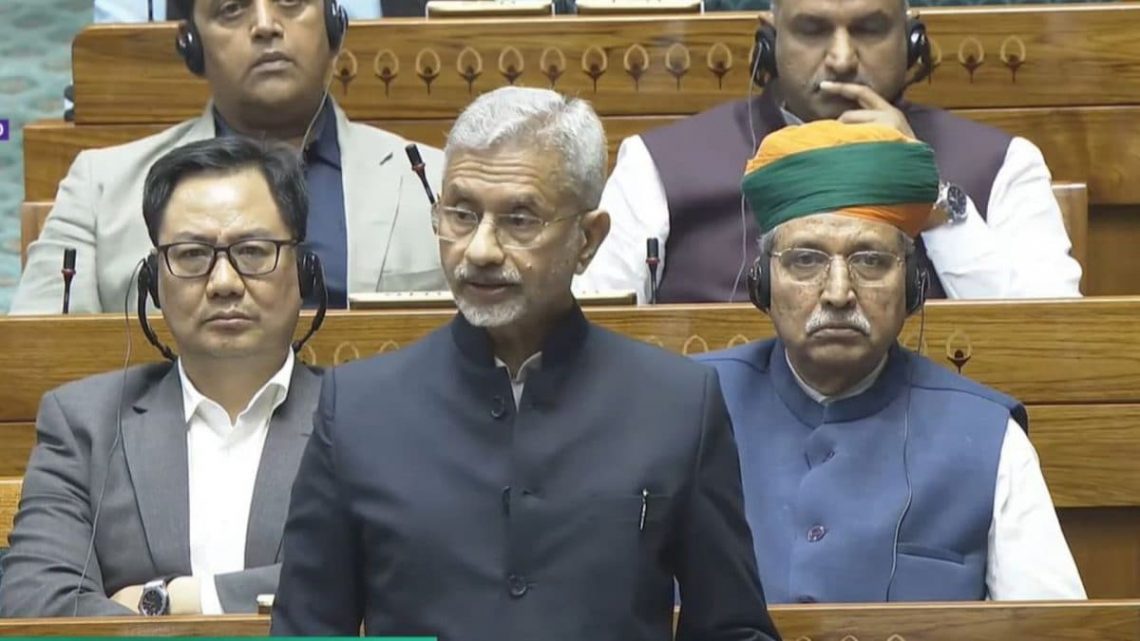External Affairs Minister (EAM) S Jaishankar on Tuesday said that the India-China ties have improved and that India remains “committed to engaging with China through bilateral discussions to arrive at a fair, reasonable and mutually acceptable framework for a boundary settlement.”
Briefing the Lok Sabha on India-China ties as well as the disengagement at the Line of Actual Control (LAC) in eastern Ladakh, Jaishankar said that the bilateral relations between India and China have been “abnormal” since the 2020 Galwan Valley clash when “peace, tranquillity in border areas were disturbed due to Chinese actions”.
Jaishankar said, “The immediate priority was to ensure disengagement from friction points so that there would be no further untoward incidents or clashes. This has been fully achieved. The next priority will be to consider de-escalation, that would address the massing of troops along the LAC with associated accompaniments.”
“Recent developments that reflect continuous diplomatic engagements have set Indo-China ties in direction of some improvement,” Jaishankar said, adding that military and diplomatic level talks between India and China had successfully resolved recent border issues.
“The House is well aware of the circumstances leading up to the violent clashes in Galwan Valley in June 2020. In the months thereafter, we were addressing a situation that had not only seen fatalities for the first time in 45 years, but also a turn of events serious enough for heavy weaponry to be deployed in close proximity to the LAC. While a determined counter deployment of adequate capability was the Government’s immediate response, there was also the imperative of a diplomatic effort to defuse these heightened tensions and restore peace and tranquility,” he said.
Jaishankar said that India was and will remain very clear that the three key principles must be observed in all circumstances:
1 – both sides should strictly respect and observe the LAC,
2 – neither side should attempt to unilaterally alter the status quo, and
3 – agreements and understandings reached in the past must be fully abided by in their entirety.
Jaishankar also credited the Indian forces, saying that despite logistical challenges and the Covid pandemic, they countered the Chinese troops rapidly.
The EAM informed the parliament that disengagement now has been achieved in full in Eastern Ladakh through a step by step process, culminating in Depsang and Demchok. “With the task of disengagement completed, it is now our expectation that discussions would commence in regard to the remaining issues that we had placed on the agenda,” he added.
“Where the October 21, 2024 understanding is concerned, our objective has been to ensure patrolling as in the past to the relevant patrolling points, as well as resumption of grazing by our civilians as per longstanding practice. This is indeed what we have agreed upon in regard to Depsang and Demchok,” Jaishankar said.
He went on to say that in a few other places where friction occurred in 2020, steps of a temporary and limited nature were worked out, based on local conditions, to obviate the possibility of further friction. “This, I must stress, applies to both sides and can be revisited as the situation demands. In that sense, our stance has been resolute and firm and serves our national interest fully,” the minister said.
“Our relationship had progressed in many domains, but was obviously negatively affected by recent events. We are clear that the maintenance of peace and tranquility in border areas is a pre-requisite for the development of our ties. In the coming days, we will be discussing both de-escalation as well as effective management of our activities in the border areas,” Jaishankar said.
“The conclusion of the disengagement phase now allows us to consider other aspects of our bilateral engagement in a calibrated manner, keeping our national security interests first and foremost,” he said.
Link to article –
‘Next priority is de-escalation’: Jaishankar briefs Parliament on India-China disengagement

